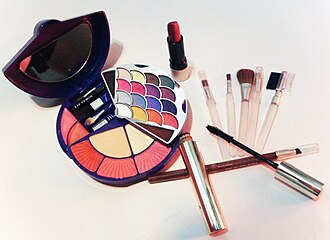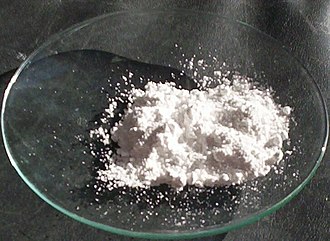Ingredients of cosmetics



Ingredients of cosmetics are substances or mixtures of substances used in the formulation of cosmetics and personal care products. These ingredients serve various functions, such as cleansing, moisturizing, altering appearance, and protecting the skin. The composition of cosmetics has evolved significantly over time, with advances in chemistry, dermatology, and biotechnology leading to the development of safer, more effective, and more diverse products.
Types of Cosmetic Ingredients[edit]
Cosmetic ingredients can be broadly categorized into several types based on their function within the product:
Active Ingredients[edit]
Active ingredients are responsible for providing the intended benefits of a product, such as sunscreen agents in sun protection products or hydroxy acids for exfoliation. Examples include salicylic acid in acne treatments and hyaluronic acid in moisturizers.
Base Ingredients[edit]
Base ingredients, also known as carriers, are used to deliver the active ingredients to the skin, hair, or nails. They form the primary volume of the product and can include water, oils, and waxes.
Emulsifiers[edit]
Emulsifiers are ingredients that help blend substances that typically do not mix well, such as oil and water. They are crucial in products like lotions and creams to ensure a stable and uniform texture.
Preservatives[edit]
Preservatives are added to cosmetics to prevent the growth of microorganisms, thereby protecting the product from spoilage and protecting consumers from infections. Common preservatives include parabens, formaldehyde donors, and isothiazolinones.
Fragrances and Dyes[edit]
Fragrances and dyes are added to products to enhance their appeal by adding scent and color. However, they can also be allergens or irritants for some individuals.
pH Adjusters[edit]
pH adjusters are used to modify the pH of cosmetics to ensure they are compatible with the natural pH of the skin or hair. Examples include citric acid and sodium hydroxide.
Regulation[edit]
The regulation of cosmetic ingredients varies by country, with agencies such as the U.S. Food and Drug Administration (FDA) in the United States and the European Union's European Commission overseeing the safety and labeling of cosmetics. Regulations typically require safety testing and approval of certain ingredients, especially color additives and those classified as over-the-counter drugs.
Controversies and Concerns[edit]
Some cosmetic ingredients have been the subject of controversy and health concerns. For example, parabens and certain sunscreens have been linked to hormonal disruptions and other health issues in some studies. This has led to increased demand for "clean beauty" products formulated without certain controversial chemicals.
Natural and Organic Ingredients[edit]
There is a growing trend towards using natural and organic ingredients in cosmetics, driven by consumer demand for safer and more environmentally friendly products. These ingredients are sourced from plants, minerals, and other natural sources, and are often marketed as being gentler and more sustainable.
Innovation in Cosmetic Ingredients[edit]
The cosmetic industry continues to innovate, with research focusing on developing new ingredients that offer enhanced benefits or reduce potential health risks. Recent trends include the use of biotechnology to produce ingredients, such as peptides and stem cells, and the exploration of novel sources, such as marine organisms.
Ad. Transform your life with W8MD's Budget GLP-1 injections from $75


W8MD offers a medical weight loss program to lose weight in Philadelphia. Our physician-supervised medical weight loss provides:
- Weight loss injections in NYC (generic and brand names):
- Zepbound / Mounjaro, Wegovy / Ozempic, Saxenda
- Most insurances accepted or discounted self-pay rates. We will obtain insurance prior authorizations if needed.
- Generic GLP1 weight loss injections from $75 for the starting dose.
- Also offer prescription weight loss medications including Phentermine, Qsymia, Diethylpropion, Contrave etc.
NYC weight loss doctor appointmentsNYC weight loss doctor appointments
Start your NYC weight loss journey today at our NYC medical weight loss and Philadelphia medical weight loss clinics.
- Call 718-946-5500 to lose weight in NYC or for medical weight loss in Philadelphia 215-676-2334.
- Tags:NYC medical weight loss, Philadelphia lose weight Zepbound NYC, Budget GLP1 weight loss injections, Wegovy Philadelphia, Wegovy NYC, Philadelphia medical weight loss, Brookly weight loss and Wegovy NYC
|
WikiMD's Wellness Encyclopedia |
| Let Food Be Thy Medicine Medicine Thy Food - Hippocrates |
Medical Disclaimer: WikiMD is not a substitute for professional medical advice. The information on WikiMD is provided as an information resource only, may be incorrect, outdated or misleading, and is not to be used or relied on for any diagnostic or treatment purposes. Please consult your health care provider before making any healthcare decisions or for guidance about a specific medical condition. WikiMD expressly disclaims responsibility, and shall have no liability, for any damages, loss, injury, or liability whatsoever suffered as a result of your reliance on the information contained in this site. By visiting this site you agree to the foregoing terms and conditions, which may from time to time be changed or supplemented by WikiMD. If you do not agree to the foregoing terms and conditions, you should not enter or use this site. See full disclaimer.
Credits:Most images are courtesy of Wikimedia commons, and templates, categories Wikipedia, licensed under CC BY SA or similar.
Translate this page: - East Asian
中文,
日本,
한국어,
South Asian
हिन्दी,
தமிழ்,
తెలుగు,
Urdu,
ಕನ್ನಡ,
Southeast Asian
Indonesian,
Vietnamese,
Thai,
မြန်မာဘာသာ,
বাংলা
European
español,
Deutsch,
français,
Greek,
português do Brasil,
polski,
română,
русский,
Nederlands,
norsk,
svenska,
suomi,
Italian
Middle Eastern & African
عربى,
Turkish,
Persian,
Hebrew,
Afrikaans,
isiZulu,
Kiswahili,
Other
Bulgarian,
Hungarian,
Czech,
Swedish,
മലയാളം,
मराठी,
ਪੰਜਾਬੀ,
ગુજરાતી,
Portuguese,
Ukrainian


